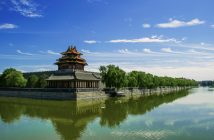
As students residing in one of China’s rapidly developing megacities, we have all witnessed the air and water pollution on an appalling scale. Despite this, those of us who have heard of China’s “cancer villages” may still be skeptical of recent claims that these establishments are closely related to water contamination.But lately, the Chinese government confirmed that water pollution and China’s high cancer rates are directly linked. Several reliable sources estimate that the country “is home to 459 of [these ‘cancer villages’]” and will only foster the increase of more such villages.
China’s extreme economic growth has carried unthinkable human and environmental costs—the country’s infamous “cancer villages” is one such example.These so-called cancer villages have high cancer rates that soar far beyond the national average. Oftentimes, villagers access drinking water from nearby rivers—many of which have been heavily polluted by toxic chemical discharges from various factories. China Daily states that over 70 percent of China’s rivers and lakes are polluted and the government reports “almost half may contain water that is unfit for human contact”.However, most villagers are left with no other option but to use contaminated water for washing, agriculture, and drinking. One villager, Guo Xinxiang, tells China Daily that they drink river-water with no purification. Even more shockingly, the water he and several hundred others drink often contains red worms as long as chopsticks and as thin as thread.Countless fish float along China’s filthy rivers, having died from the pollution.The water in one village is black in color; in another, bright red. Not only is the water’s stench unbearable, mere “skin contact with it results in itching and even septic rashes.”
One villager states that in his village, “everybody … has some form of illness”. His mother is diagnosed with bronchitis,his nephew died of Evans syndrome and his neighbor is dying of oesophageal cancer, while another died of stomach cancer last year.In another village, one of China Daily’s investigators met a cancer patient whose neck was as thick as his head. It is difficult to pinpoint the exact source of these horrific illnesses, although recently, studies have reaffirmed that water pollution from factories is directly related to this unfortunate mystery.
Lately, Greenpeace undertook an investigation to examine the waste waters of two textile-manufacturing facilities in China as indicators of what China’s factories are generally like. They found that both facilities have been discharging a range of persistent and toxic chemicals into two of China’s largest rivers. In addition to assessing whether hazardous chemicals were being deposited into China’s rivers, Greenpeace sought to identify which companies the two facilities were supplying. Companies found to have commercial relationships with the two facilities include Abercrombie & Fitch, Adidas, Calvin Klein, Converse, Cortefiel, H&M, Li Ning, Meters Bonwe, Nike, Puma, and Youngor. As brand owners, these companies have significant influence on environmental impacts of production. They should take responsibility to cooperate with their suppliers in eliminating toxic waste created during the production process.As consumers, we have the power to pressure such firms.Recently, in response to consumer pressure, the three largest sportswear businesses – Nike, Puma, and Adidas – created basic labor and environmental health standards. Although it is not of the norm to believe one has the responsibility and ability to change the society in such ways, take up such a challenge. Do not dismiss seemingly irrational actions,when they have the potential to reap great benefits.
The environment has been exploited beyond the point of renewal. China’s water, soil, and air have been degraded to unthinkable severity. The only thing villagers residing in China’s growing “cancer villages” ask for is to “breathe clean air, drink safe water and use uncontaminated soil” – it is “all [they]ask for. China’s government is neither taking immediate nor enough regulation over the environmental and health impacts due to the country’s breakneck economic growth. As consumers, we have the responsibility to step in and pressure corporations. As consumers, we have choice in the products we purchase. But as global citizens, we hold the responsibility of exerting maximum effort to change things for the better.As global citizens, we have the ability to respond to the environment’s degradation and to those who do not have the means to improve their own quality of life.
Research released in june by the chinese center for disease control and prevention said deaths related to lung cancer in Shenqiu increased 14-fold for men and 20-fold for women between 1973 and 2005
"All I wish for is to breathe clean air, drink safe water and use uncontaminated soil. That’s all I ask for, but I guess that is just too much to ask." Wei Donying, activist.
The village’s ducks, chickens and geese began dying en masse.
"China is suffering from the negative impact of improper economic growth patterns. And the country will continue to pay the price for heavy pollutants in the future."
The latest sign of fast economic growth taking a heavy toll on the environment.
UNIT-E was founded in the spring of 2010 with the aim of establishing a non-profit, student-run magazine for international students in Beijing. Staffed by current students from a range of international schools, the magazine provides an amalgam of cultural tidbits, fragments of Beijing student life, and a broad spectrum of unique perspectives from a diverse group of young adults.
Photo courtesy of UNIT-E



